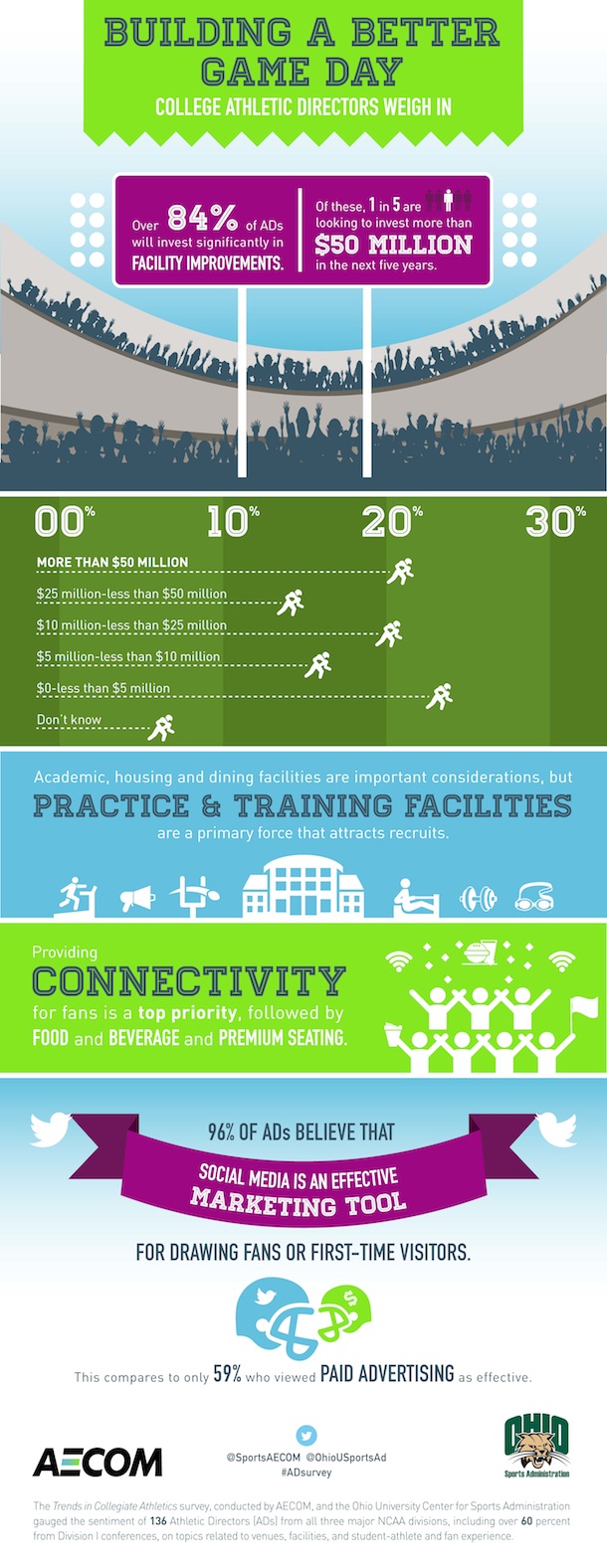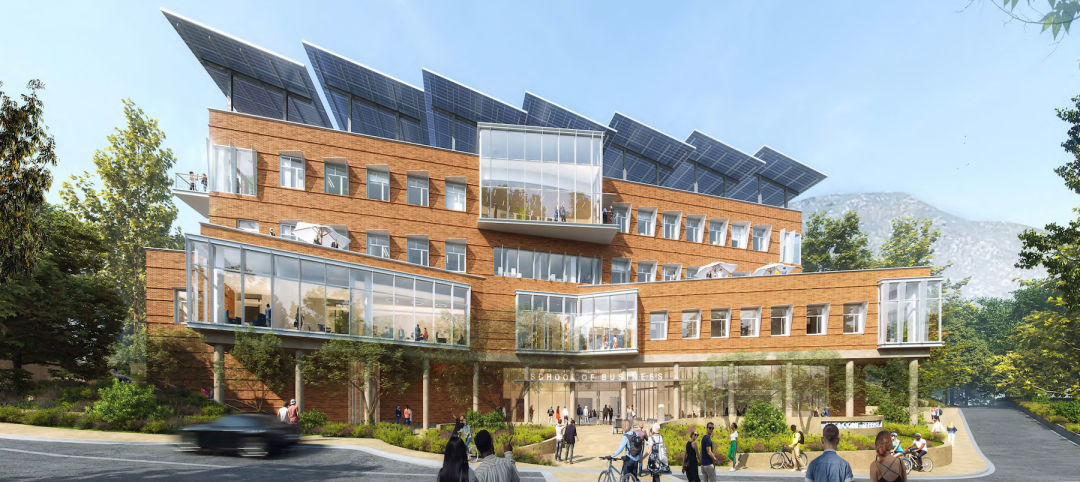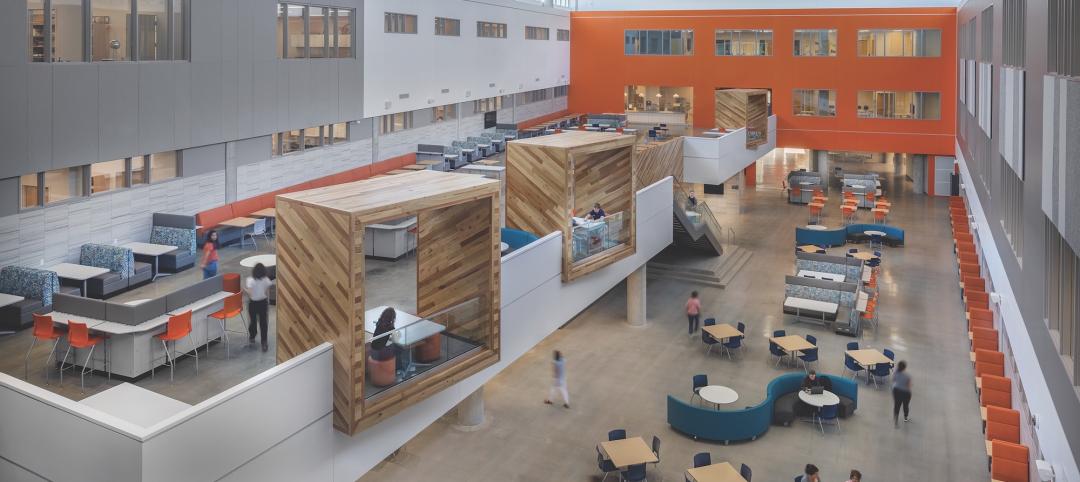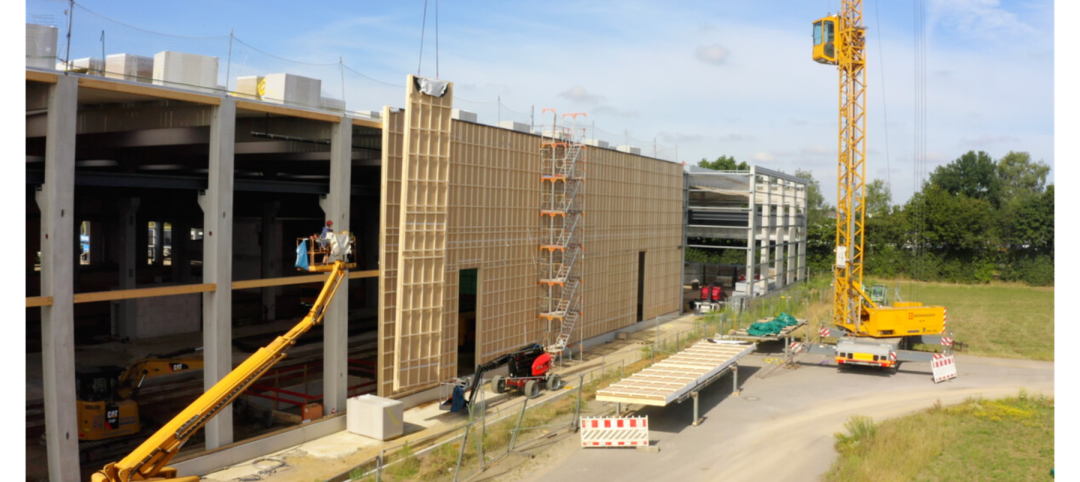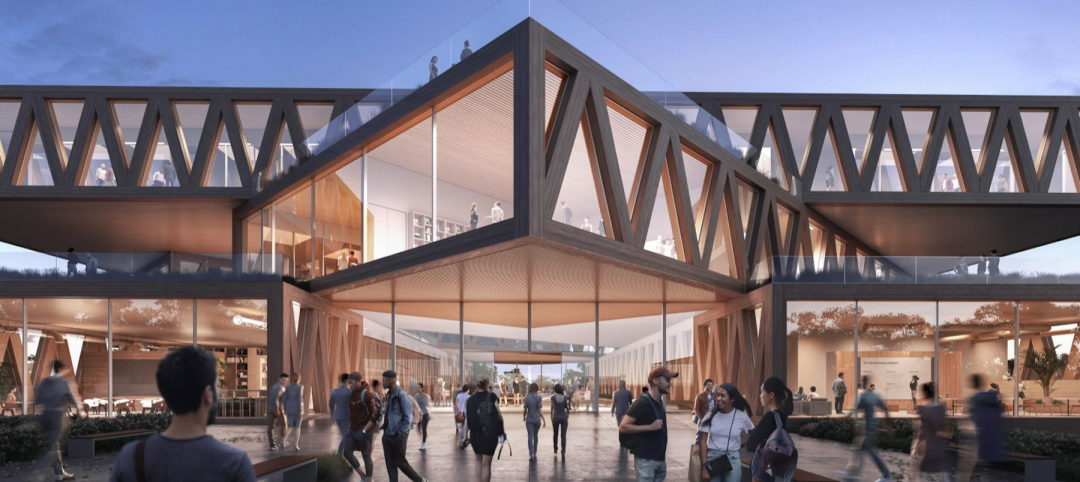According to a survey released today, NCAA athletic directors (ADs) are increasingly focused on enhancing athletic facilities to attract top student athletes and maintain or grow their fan base amidst an extremely competitive environment.
The Trends in Collegiate Athletics survey, conducted by AECOM and Ohio University's Center for Sports Administration, was completed in July-August 2014. The survey gauged the sentiment of 136 ADs from all three major NCAA divisions, including over 60% from Division I conferences, on topics related to venues, facilities, and student-athlete and fan experience.
According to the survey, more than eight in 10 participating ADs plan to make significant investments in facilities over the next five years to target potential recruits and spectators. Of those, one in five plans on spending more than $50 million on renovations and new construction projects. Nearly 95% of ADs are concerned about the funding of their programs.
The majority of participating ADs are investing in upgrades and amenities that they believe will drive game-day attendance and enhance the fan experience, notably connectivity, better food and beverage options, and, particularly at the Division I level, premium seating.
“This survey shows that, as traditional funding streams become less viable, ADs are increasingly focused on fiscal responsibility and making their programs sustainable,” said Jon Niemuth, AECOM Director of Sports, Americas. “One way they are doing this is by investing in upscale amenities, once reserved for the professional level, that will attract fans willing to pay a premium for a unique game day experience.”
“A big issue keeping athletic directors up at night is the funding and performance of their programs,” said Dr. Heather Lawrence-Benedict, Associate Professor of Sports Administration and the AECOM Professor of Sport Business, Ohio University. “ADs are caught in a cyclical pattern—to generate funding they need talented recruits, to attract recruits they need the top facilities, and to build those facilities it goes back to funding. On top of this, they need to appeal to alumni and donors. An unexpected donation, a breakout athlete or a Cinderella season can all be major catalysts for an athletics program.”
To help generate awareness for their upgrades and promote games and game-day activities, the vast majority of ADs (96%) in the study find social media to be an effective marketing tool for drawing fans or first-time visitors to games. That compares to 59% who view paid advertising as effective. Lowering ticket costs was ranked as the least effective option to draw fans by one-third of participating ADs.
ADs are also focused on facility upgrades that will enhance the student athlete experience, and ADs overwhelmingly agree that practice and training facilities are a primary force that attracts recruits, while academic, housing and dining facilities are also rapidly becoming important. If funding was not a factor, ADs would invest heavily in practice and training facilities and locker rooms to appeal to potential recruits.
AECOM and Ohio University’s Center for Sports Administration developed the Trends in Collegiate Athletics through a collaborative effort as part of their ongoing strategic partnership, which began in 2007. The joint effort, which was extended for the third time in 2013, is aimed at educating the next generation of sports business leaders.
To view the full results of the survey, click here.
Related Stories
Codes and Standards | Nov 2, 2022
New York City construction official wants to boost design-build
The new associate commissioner of alternative delivery in New York City’s Department of Design and Construction aims to encourage more design-build project delivery in the city.
University Buildings | Nov 2, 2022
New Univ. of Calif. Riverside business school building will support hybrid learning
A design-build partnership of Moore Ruble Yudell and McCarthy Building Companies will collaborate on a new business school building at the University of California at Riverside.
Building Team | Nov 1, 2022
Nonresidential construction spending increases slightly in September, says ABC
National nonresidential construction spending was up by 0.5% in September, according to an Associated Builders and Contractors analysis of data published today by the U.S. Census Bureau.
40 Under 40 | Nov 1, 2022
40 Under 40 class of 2022 winners: Meet the architects
Of the up-and-coming AEC professionals to be named 40 Under 40 class of 2022 winners by the editors of Building Design+Construction, 22 make their living in the architecture profession.
K-12 Schools | Nov 1, 2022
Safety is the abiding design priority for K-12 schools
With some exceptions, architecture, engineering, and construction firms say renovations and adaptive reuse make up the bulk of their work in the K-12 schools sector.
| Nov 1, 2022
Updated Florida building codes helped newer homes withstand Hurricane Ian
Newer homes seemed to fare much better than older structures during Hurricane Ian, suggesting that updated Florida building codes made a difference.
Wood | Nov 1, 2022
A European manufacturer says its engineered wood products can store carbon for decades
Metsä Wood, a Finland-based manufacturer of engineered wood products, says its sustainable, material-efficient products can store carbon for decades, helping to combat climate change.
Data Centers | Oct 31, 2022
Data center construction facing record-breaking inflation, delays
Data center construction projects face record-breaking inflation amid delays to materials deliveries and competition for skilled labor, according to research from global professional services company Turner & Townsend.
School Construction | Oct 31, 2022
Claremont McKenna College science center will foster integrated disciplinary research
The design of the Robert Day Sciences Center at Claremont McKenna College will support “a powerful, multi-disciplinary, computational approach to the grand socio-scientific challenges and opportunities of our time—gene, brain, and climate,” says Hiram E. Chodosh, college president.
Energy Efficient Roofing | Oct 28, 2022
Rooftop mini turbines can pair with solar panels
A new type of wind turbine can pair well on roofs with solar panels, offering a double source of green energy generation for buildings.










